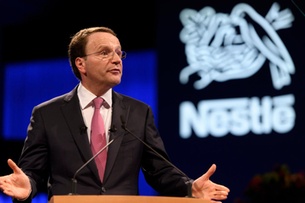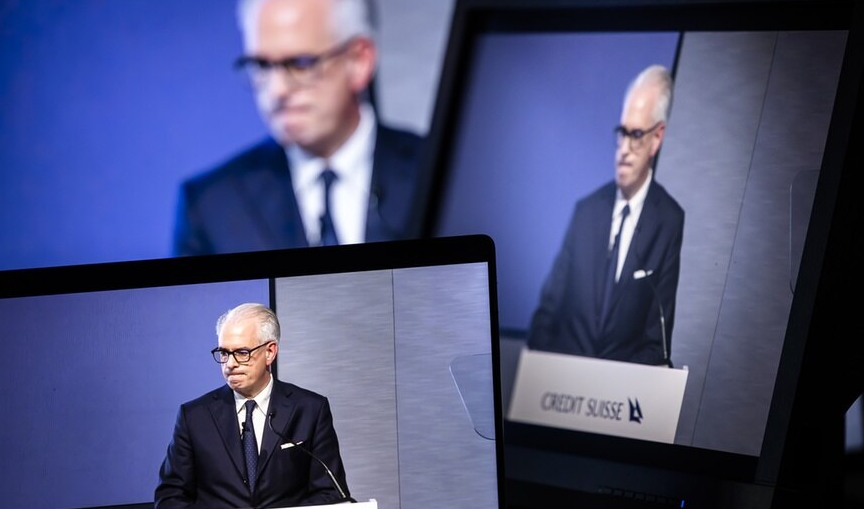The world’s largest food and drinks company is in need of a shake-up, according to its newest big shareholder, the activist hedge-fund Third Point. Will it provide one?
Mark Schneider, Nestlé chief executive, addressed a conference in Berlin last week. “Size alone won’t protect you from change,” he told the Consumer Goods Forum and, after listing the challenges facing the industry, added that “status quo is not an option”.
What the audience did not know, was that weeks earlier, Mr Schneider had agreed to meet Daniel Loeb, founder and chief executive of Third Point, the US activist hedge fund that disclosed late on Sunday that it had taken a 1.25 per cent stake in Nestlé, worth $3.5bn.
Third Point urged “bold action”, saying shares in the “staid” Swiss group had significantly underperformed most peers “despite having arguably the best positioned portfolio” in consumer goods, including Nespresso coffee, baby food, pet food and KitKat chocolate bars.
Shares in Nestlé closed up 4 per cent at SFr85.35 on Monday – their biggest one-day increase since 2011 – as investors welcomed the possibility of change. The world’s largest food and drinks company reacted coolly to the fund’s arrival, however, saying: “As always, we keep an open dialogue with all of our shareholders.”
With a market capitalisation of SFr256bn ($264bn), the group had appeared beyond the reach of activist investors. “It is totally new for Nestlé,” said Jean-Philippe Bertschy, analyst at Vontobel in Zurich. “It was thought too big for an activist.”
But Third Point’s intervention highlights the extent of the upheaval facing a global food sector hit by sluggish growth and rapidly changing consumer trends, including a backlash against “big food” and processed products.
For the second time this year, one of the giants of the industry has come under attack. In February, the sector was shaken by the $143bn takeover approach for Unilever, from Kraft Heinz, a company with less than half the Anglo-Dutch’s group’s €53bn of annual sales.
3G Capital and Warren Buffett, Kraft Heinz’s backers, quickly dropped the offer in the face of Unilever’s opposition. But the audacious approach was not lost on Nestlé which, along with Unilever and France’s Danone, has the weakest operating profit margins among large consumer staples.
Andrew Wood, analyst at Bernstein, said: “Like Unilever, Nestlé has arguably been lackadaisical and complacent, and underperformed its potential. It is not (yet) fighting for its independence like Unilever, but might still feel that a fire has been lit under its feet.
Third Point’s move could also lead to increased pressure on Danone, which has undershot earnings expectations in recent years, making it potentially vulnerable to activist or takeover interest.
Some analysts say Third Point’s agitation could help Mr Schneider shake up a company which has, at times, appeared impervious to the urgency of change.
Mr Schneider was already expected to oversee a strategic rethink, and many of Third Point’s suggestions were probably already under consideration. Mr Bertschy said: “He wouldn’t say so, but it could be great for Mr Schneider, helping his plans work faster internally.”
So far, Mr Schneider has overseen modest changes. This month, Nestlé announced it was quitting the US confectionery market, which generated SFr900m in sales last year, after failing to build market leading positions. Last week, it took a small stake in Freshly, a US online ready meals service.
But Mr Schneider, who joined Nestlé in January from German healthcare group Fresenius, has already hinted at a broader shake-up, details of which could be announced at an investor day in September.
Driving his thinking have been the pressures unleashed by Kraft Heinz’s aborted Unilever bid, which highlighted the tension between traditional business models pursued by Nestlé and Unilever based on relatively high levels of investment, and the demands of shorter-term investors to slash costs to boost profitability.
Shortly after taking over at Nestlé, Mr Schneider indicated sales growth would be the principal yardstick against which his leadership should be measured. “The guys that go for the slash and burn model, sooner or later they have to walk,” he told the Financial Times in February.
But in an analyst briefing in April, Mr Schneider appeared to change tack. He acknowledged investors expected “improved” combinations of profit margins and sales growth. “We got the message,” he said. “We’re certainly determined to move in that direction.”
That comment fuelled speculation Nestlé would target profit margins – as Unilever has done – as well as sales growth. In its letter, Third Point proposed a margin target of 18-20 per cent by 2020. A not unrealistic aim compared with last year’s operating profit margin of 15.3 per cent, especially if Nestlé were to make further disposals – but still well below Kraft Heinz’s industry-beating 29 per cent.
Third Point’s other proposals are likely to face more resistance, however.
The US fund urged Nestlé to sell its remaining 23 per cent shareholding in L’Oréal, the French cosmetics group, valued at roughly $25bn. But Mr Schneider in February described the stake as “strategic” and as yielding “stellar financial returns”. That suggested he would not rush to sell unless Nestlé had decided on an alternative use for the funds. L’Oréal declined to comment.
Nestlé is also likely to be wary about Third Point’s call for a “comprehensive portfolio review” of its more than 2,000 brands. Long-serving managers say they are constantly assessing all its business to maximise performance.
Warren Ackerman, analyst at Société Générale, said: “The ball is very much in Nestlé’s court and this move ups the pressure at its September investor day to set out a very clear vision with some concrete numbers.
Full story here Are you the author? Previous post See more for Next post
Tags: Business,newslettersent










































